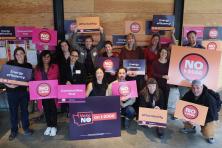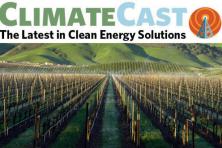“We know that the clean energy future will be electric”
Washington State—The Washington State Building Code Council (SBCC) is currently considering the adoption of a stronger energy code that includes proposals to require high-efficiency electric space and water heating in new commercial and large multifamily (four stories and higher) buildings. The SBCC updates and improves building and energy codes only once every three years, making 2022 a unique opportunity to adopt the most climate-friendly statewide building energy code in the country.
The SBCC held an additional public meeting on March 11, 2022 following its initial public meeting on February 25, 2022, to hear testimony for the code proposals. Notably, both public meetings demonstrated an overwhelming majority of broad and diverse support across the state for these code proposals. Over 5,000 people submitted comments in support representing community voices, as well as air quality and equity advocates, over 40 building industry professionals, over 100 other businesses and major employers, labor unions, affordable housing groups and advocates, over 100 health care and public health officials, environment and climate organizations (two letters in support and comment), almost 300 faith leaders, and over 80 local elected officials representing 41 jurisdictions across the state all submitting letters in support.
Top testimony highlights included a number of local elected officials including representatives from Bellingham which recently passed an ordinance requiring the same code proposals in its commercial and large multifamily buildings. Seth Vidaña, City of Bellingham’s Climate and Energy Manager, as well as City Councilmember Michael Lilliquist, both spoke on the need for statewide support for local efforts. Said Mr. Vidaña, “Our hope is that our local efforts would result in a conversation at the state level. All cities should be engaging in climate work so that all cities do not have to go through the lengthy process to pass this code.”
Testimony also underscored the opportunity that action on new buildings represents for the state, with building and HVAC industry representatives, environmental advocates, and housing groups lifting the concern to stop increasing dependence on fossil fuel infrastructure for years to come. Said Nathan Ellis-Brown with the Low Income Housing Institute, “Strengthening energy codes…and constructing efficient and quality buildings means lower energy bills for our residents. If we don’t help create opportunities for low-income customers to move off fossil fuels now, they will be left holding the bill for any stranded infrastructure down the line after wealthier residents have chosen to move off the gas system.” Sean Denniston of the New Buildings Institute reiterated that the code updates will help Washington stay aligned with its energy and greenhouse gas reduction goals, “Heat pumps are, when you look at code-compliant equipment, four or more times as efficient as their gas counterparts. Those gains alone justify [these code updates], particularly to keep the code on track to meet its 2031 goals.”
Particularly impactful was testimony from doctors and nurses speaking on the health impacts of gas. Said Dr. Annemarie Dooley member of Washington Physicians for Social Responsibility, “Building codes really matter to my patients and my community…There is lots of talk about costs—but the costs to whom? People rarely talk about the health costs. Fossil fuels are really a luxury we can no longer afford.”
A limited number of opposition testimony again showed familiar faces hoping to delay or block action on clean energy, climate, and building electrification proposals including representatives from the gas industry. Across the country, efforts to reduce pollution from buildings continue to be met with organized resistance and misinformation from the gas industry, setting up a familiar story of clean energy and climate struggles against the oil and fossil fuel industry.
Building electrification is on the rise nationally, and local jurisdictions in Washington have already taken action this year to accelerate the transition towards clean electrification and away from gas use for space and water heating building; local communities recently moving forward include Seattle, Shoreline, Bellingham, Tacoma, and Olympia.
MORE ON THE STATE BUILDING CODE COUNCIL AND CODE UPDATE PROCESS:
The State Building Code Council is a 15 member state agency appointed by the governor’s office to develop statewide building codes. Council members represent various sectors and industries related to building and energy work, including construction, architecture, structural engineering, mechanical engineering, building trades, manufacturing and installation of building materials, and more, as well as seats for certain elected and government officials, and for at least one person with disabilities. At least six members must be from east of the Cascades.
The SBCC updates the commercial energy code, which also applies to large multifamily buildings (over four stories), every three years. Last year, the SBCC began the process of collecting code change proposals that were vetted by its Technical Advisory Group. Those proposals are now open for public input. The public comment period ends on March 11 and the SBCC will vote on the proposed code updates at its April 22nd meeting.
Recording will be available on SBCC website: https://sbcc.wa.gov/meeting-schedules-agendas/council-standing-committe…
MORE BACKGROUND:
Building electrification efforts part of a national trend on climate
Buildings are one of the largest and fastest-growing sources of climate pollution in Washington, and contribute about one-quarter (23%) of Washington state’s carbon emissions, more than the industrial sector. The bulk of building emissions come from burning fossil fuels for space and water heating and cooking. Energy codes that direct the heating, cooling, and powering of buildings to be electric are increasingly being utilized as a central tool in cities and states across the country to reduce emissions, reduce maintenance and operational costs, prioritize public health and safety, and meet climate goals. Notably Washington’s 2021 State Energy Strategy found that electrifying buildings will be the lowest-cost pathway to economy-wide 95% carbon reductions by 2050.
Clean buildings policies align with public health and safety needs
Accelerating building electrification and prioritizing public health are also increasingly seen by doctors and public health officials to go hand-in-hand. Clean and safe buildings powered by electricity are better protected from outdoor and indoor air pollution, more resilient during major catastrophes like earthquakes, and can collectively lead to healthier communities. Particulate matter (PM2.5) pollution from commercial and residential buildings, primarily the result of gas appliances, is responsible for approximately 18,300 early deaths and $205 billion in health impacts per year nationwide. In Washington alone, outdoor emissions of nitrogen oxides (NOx) and volatile organic compounds (VOCs)—two of the pollutants associated with burning gas specifically— from commercial buildings cost the state an estimated $110 million in health impact costs. Pollution from extracting and burning gas accelerates climate change—and it exacerbates asthma and other respiratory health risks, especially for children, the elderly, lower income, and Black, Indigenous and communities of color, who are already disproportionately bearing the burden of air pollutants.
###
ABOUT SHIFT ZERO
Shift Zero’s mission is to catalyze a just transition to zero carbon buildings for all in Washington State. We do this by advocating for policies and programs that maximize energy efficiency and eliminate emissions from buildings. As an alliance, we convene our members’ technical, policy, and advocacy expertise to identify solutions that can scale up to meet the urgency of the climate crisis. Collectively, we educate decisionmakers about how proven design approaches and building technologies can be leveraged to create affordable access to high-performance, resilient buildings. info@shiftzero.org




